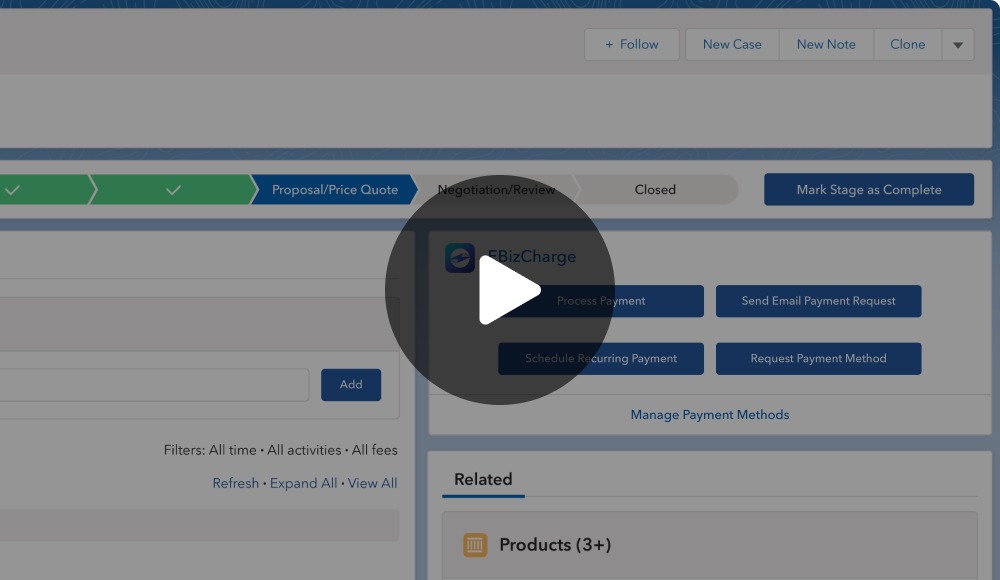Blog > How to Choose a Salesforce Accounting Solution: 7 Key Factors to Consider
How to Choose a Salesforce Accounting Solution: 7 Key Factors to Consider
There’s something magical that happens when you combine two things. Chocolate and peanut butter are delicious on their own, but when you bring them together, it’s an entirely new experience.
The same thing could be said for Salesforce and accounting software. Both are powerful tools, but when paired together, merchants unlock a whole new world of business operations.
Businesses can use Salesforce accounting to gain a holistic view of critical data, make strategic decisions, simplify workflows, save time, and boost their bottom line. When choosing a solution, there are 7 key factors merchants should consider ensuring their solution brings value to their business.
- Seamless integration
- Flexibility and scalability
- Cost and potential savings
- Good customer support
- Robust reporting
- Strong security
- Unique needs
What is Salesforce accounting?
Traditionally, customer data and financial data remain separate, each locked in their own system. If merchants want to prepare reports or see both customer and financial data, they have to manually pull that data from two different software programs. With Salesforce accounting, the business has access to all of this data in a single interface, giving the business increased visibility.
Salesforce accounting is achieved through third-party applications that connect with both Salesforce and the accounting software. These applications act as a bridge between the CRM and the accounting software, allowing data to flow between the two programs. In some cases, these apps allow for extra features, such as Salesforce credit card processing.
5 benefits of Salesforce accounting
1. Better visibility
Businesses that implement Salesforce accounting benefit from increased data visibility. Instead of having to access multiple systems, merchants can use a single program to pull all relevant data, including customer and financial information.
2. Simplified workflow
Salesforce accounting leads to a simplified workflow because it eliminates the need to switch between different programs. Additionally, it cuts down on the steps needed to complete the accounting process.
3. Automated tasks
Many Salesforce accounting solutions use automation to simplify rote tasks, such as reconciling invoices. This automation allows businesses to streamline daily processes and spend less time on accounting and customer management.
4. Less friction between the accounting and sales teams
Using a Salesforce accounting system enables sales teams to make sales directly in Salesforce. Instead of reaching out to the accounting team or opening another program to process a credit card, salespeople can simply run a customer payment inside Salesforce, and the payment reflects back in the accounting software. Salespeople won’t have to wait on the accounting team to approve payments; they can run payments on the spot. Likewise, the accounting team will have less busywork running customer payments in the back office.
5. Faster sales pipeline
Because salespeople don’t have to rely on the accounting team to process payments, they can make more sales and cut out several steps in the sales pipeline, leading to a better bottom line.
How to choose a Salesforce accounting solution: 7 key factors to consider
These factors will ensure you make a sound decision that fits your needs and ultimately brings value to the business.
1. Seamless integration
Your Salesforce accounting solution should be built to seamlessly integrate with the Salesforce platform and existing processes for maximum efficiency.
2. Flexibility and scalability
Look for a solution that offers cloud-based services, as this will give you the flexibility to easily collaborate with team members and access data from anywhere. Similarly, make sure your chosen solution can scale alongside your growing business.
3. Cost and potential savings
Salesforce accounting solutions differ in cost; some are free, some charge a flat monthly fee, and others are priced based on the number of users. Consider the most cost-effective solution for your business, and don’t forget to factor in the money your business will recoup in time savings.
4. Good customer support
A system that combines your customer and financial data needs to be up and running for your business to operate smoothly. Make sure the solution you choose offers free, 24/7 customer support.
5. Robust reporting
One of the main benefits of a Salesforce accounting solution is the increased visibility gained by combining critical data into one system. Confirm that your chosen solution offers robust reporting tools that will give you actionable data to improve the business.
6. Strong security
When dealing with sensitive customer and financial data, you can’t afford to slip up. Your Salesforce accounting solution should offer multiple layers of security to protect data.
7. Unique needs
Finally, when choosing a Salesforce accounting solution, make sure it meets all of your business’s unique needs. Determine which features and factors are the most important to you, and research how the solution will help you achieve essential business goals.
Conclusion
On its own, Salesforce is a powerful tool for managing customer relationships, outreach, and sales. But when it’s paired with an accounting solution, merchants benefit from streamlined workflows, time savings, a better bottom line, and a stronger picture of their overall business to guide them in strategic decision-making.

